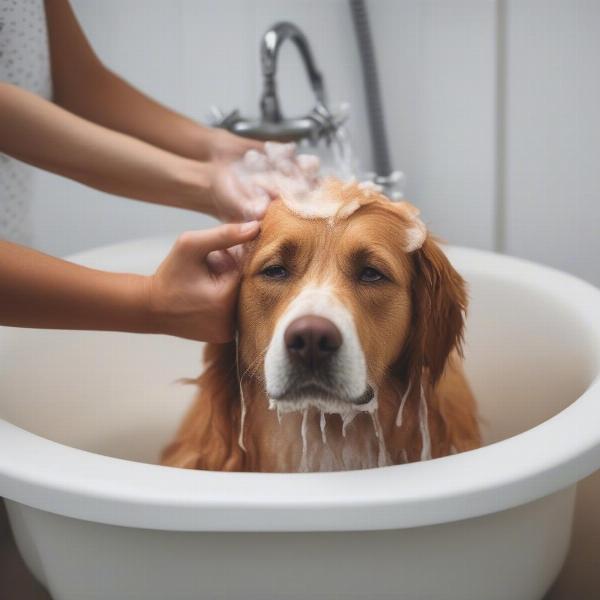Dog aftershave. It sounds almost luxurious, doesn’t it? But is it a necessary part of your canine companion’s grooming routine, or just another unnecessary product? The truth is, there’s no real need for dog-specific aftershave. While human aftershave is designed to soothe skin irritated by shaving, dogs rarely experience this issue. This article will explore the myths surrounding dog aftershave, discuss potential risks, and suggest safer alternatives for keeping your furry friend smelling fresh and clean.
While the term “dog aftershave” might conjure up images of pampered pooches, it’s crucial to understand that dogs have different skin and sensitivities than humans. Applying human aftershave to your dog can be harmful, potentially causing skin irritation, allergic reactions, or even more serious health problems if ingested. The fragrances and alcohol content in most human aftershaves are simply not suitable for canine skin. So, before you reach for that bottle of aftershave, consider the potential risks to your beloved pet.
Why Dog Aftershave Isn’t Necessary
Dogs have their own natural scent, and while we might not always find it appealing, it’s perfectly normal and healthy. Regular grooming, including bathing with a dog-specific shampoo, is the best way to keep your dog clean and smelling fresh. Over-bathing can strip away essential oils, leading to dry, irritated skin, so finding the right balance is key.
 Dog Bathing
Dog Bathing
Safe Alternatives to Dog Aftershave
If you’re concerned about your dog’s odor, there are several safe and effective alternatives to dog aftershave. Dog-specific colognes and sprays are available, but always choose products that are made with natural ingredients and avoid those containing harsh chemicals or artificial fragrances.
Another excellent option is to use a dog-friendly essential oil blend, diluted appropriately with a carrier oil like coconut or jojoba oil. Lavender, chamomile, and cedarwood are known for their calming and deodorizing properties. However, it’s crucial to consult with a veterinarian before using essential oils on your dog, as some oils can be toxic to certain breeds.
Dealing with Persistent Dog Odor
Sometimes, a persistent unpleasant odor can be a sign of an underlying health issue, such as a skin infection or dental problems. If your dog’s odor suddenly changes or is particularly strong, it’s essential to consult with a veterinarian to rule out any medical conditions.
Is Dog Aftershave Safe?
Simply put, no. Products marketed as “dog aftershave” are often unnecessary and potentially harmful. Always prioritize your dog’s health and well-being by choosing safe and appropriate grooming products.
Conclusion
While the concept of dog aftershave might seem appealing, it’s ultimately unnecessary and potentially harmful. Regular grooming, a healthy diet, and addressing any underlying medical conditions are the best ways to keep your dog smelling fresh and feeling their best. Focus on providing proper care, and your furry friend will reward you with unconditional love and a healthy, natural scent.
FAQ
- Can I use human aftershave on my dog? No, human aftershave can be harmful to dogs due to the alcohol content and fragrances.
- What’s the best way to keep my dog smelling fresh? Regular bathing with a dog-specific shampoo and proper grooming are the most effective ways.
- Are there safe alternatives to dog aftershave? Yes, dog-friendly colognes, sprays, and diluted essential oils can be used, but always choose natural ingredients and consult with your veterinarian.
- My dog has a persistent bad odor. What should I do? Consult with a veterinarian to rule out any underlying medical conditions.
- How often should I bathe my dog? The frequency of bathing depends on the breed, lifestyle, and coat type. Consult with a groomer or veterinarian for recommendations.
- Can I use baby powder on my dog? While not inherently toxic, baby powder is not recommended for dogs as it can be inhaled and cause respiratory problems.
- What are some signs of a skin infection in dogs? Redness, itching, hair loss, and a foul odor can be signs of a skin infection.
ILM Dog is your trusted source for expert advice on all aspects of dog care, from breed selection and health to training, nutrition, and grooming. We provide practical, evidence-based information to help you give your canine companion the best possible care. For more helpful tips and resources, visit our website at ILM Dog or contact us at [email protected] or +44 20-3965-8624.